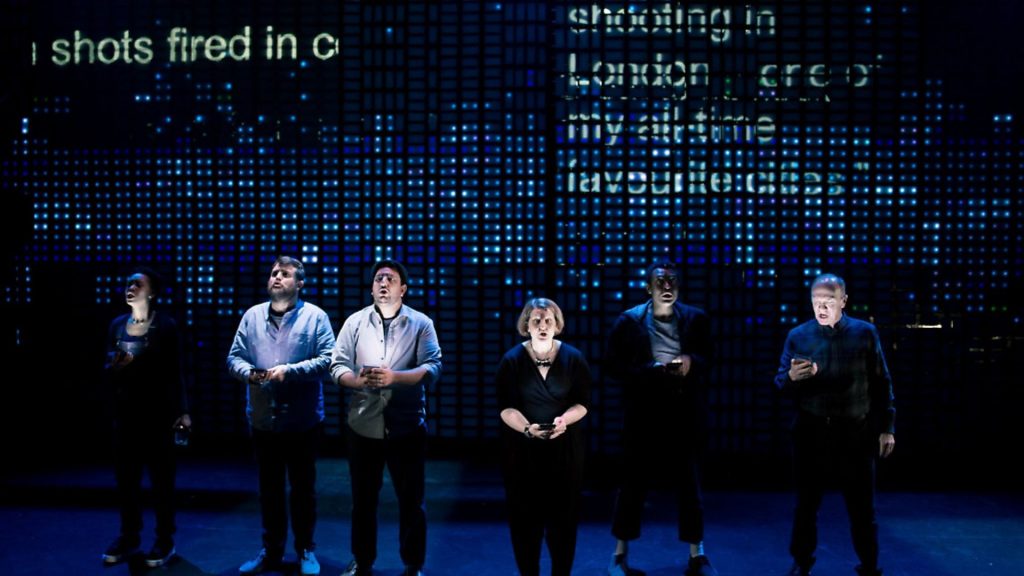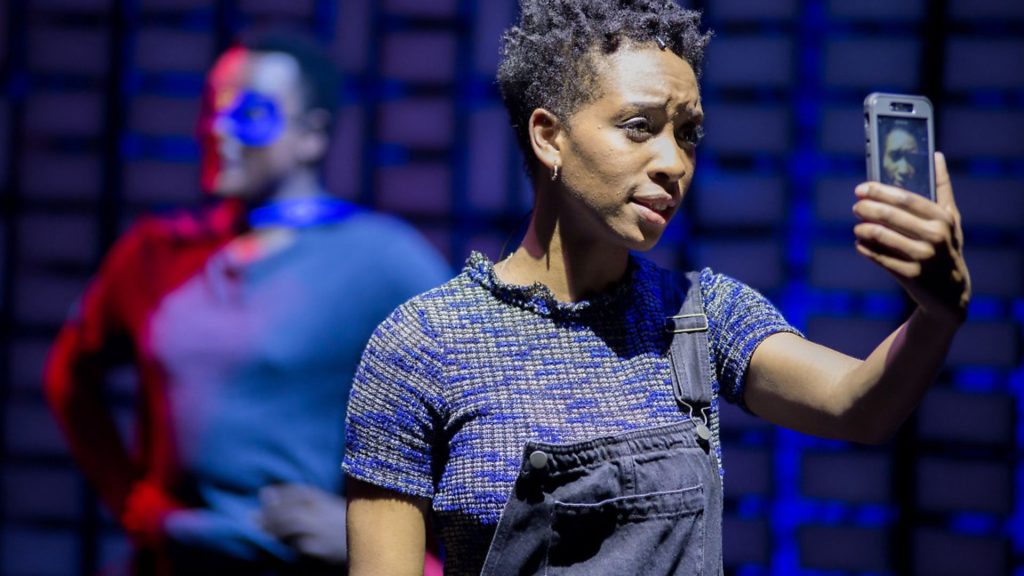
A new musical imagining the alt-right personality’s fictional murder has plenty to say about hate speech and polarised opinions, says MARTIN McQUILLAN. But is she worth the attention?

Last year, I came across Katie Hopkins standing in front of me in the queue at the press entrance to the Conservative Party conference in Manchester. Head bowed, she was wearing a hoodie pulled up tight around her face. It was difficult to imagine that this was just a response to the inclement weather.
Rather, it seemed as if the former contestant on The Apprentice, known for expressing her outspoken views on social media and in the press, was, like an alienated teenager, seeking anonymity in her hoodie. Given the protesters that have picketed the venue at previous Tory Party conferences, it could be thought of as a sensible precaution.
Later that day, inside the conference compound, Hopkins was less shy, parading in a white wedding gown with the paparazzi in tow. Apparently, she was drawing a comparison between her own divorce and the UK’s separation from the EU.
She wrote an article for Mail Online about how she had ‘decided to rock up at the Tory Party Conference in my first wedding dress’. She had not been doing much rocking from where I was standing. Later that day, I spotted her again walking past Manchester’s Bridgewater Hall, hoodie pulled tight, eyes to the ground.

This week I have been thinking about that incongruity of the publicity-seeking Hopkins and the reality of a hunched woman, hiding behind outsized sportswear in an attempt not be recognised. An original production at Theatre Clwyd in Mold this month similarly contemplates the difference between appearance and reality in the age of social media. Entitled The Assassination of Katie Hopkins, it tells the story of the social fallout after she is killed while attending an awards ceremony.
It is a musical, and in the tradition of Richard Thomas and Stewart Lee’s Jerry Springer: The Opera, offers a satire on modern media through a more traditional theatrical form. The production does not feature the death of Hopkins – all that happens off stage, before the action begins, in the classical style.
Rather, the musical is about the responses that people have to the event and how their reactions are mediated through the reporting and sharing of it. There are many funny moments, the best of which is the Gogglebox-style couple who sit at the front of the stage commenting on the television coverage.
Hopkins is an interesting case study for the theatre: all performance and bombast, hiding a more fragile and riskier inner core of truth, about what it means to be caught in the unrelenting world of social media today. The musical is rather wonderful and clever, so much so that it may be more than the real Hopkins deserves.

A brief familiarity with Hopkins’ Twitter feed might make you wonder why Chris Bush (book) and Matt Winkworth (music) have any sympathy for her. A recent Hopkins pinned tweet linked to a video of Diane Abbott discussing the resignation of her opposite number Amber Rudd. It read ‘any criticism of this fine woman is just cruel. She suffers from Type II diabetes. She doesn’t need your jibes. She needs CAKE.’ It was accompanied by a slice of cake emoji.
It is this sort of calculated outrage underwritten by regressive sarcasm that makes Hopkins a divisive figure – adored by some who enjoy a free-thinking, strong woman doling it out to the snowflakes, but reviled by many more who think cruel jokes about diabetes are among her less problematic pronouncements.
She is a full-on Trump-loving, Brexiteer whose comments on migrants and ‘the nipple-height, Muslim mayor of Londonistan’, have won her a large following on social media. To be honest, her Twitter feed is quite a hard watch – take that as a trigger warning if you want. It is like Melanie Phillips on acid, riding a Scud missile.
Over a cup of tea, Bush and Winkworth tell me that the musical has been three years in the making, starting when the referendum was only a glint in the eye of David Cameron. It was always intended to be a piece of theatre about Hopkins, though, as a way of exploring the online world of polarised voices. ‘Fortunately, Katie has stayed on–message during this time,’ jokes Bush.

The lyrics of the songs are all derived from real tweets, but anyone watching it would find it hard to describe it as an unbalanced piece. Bush says that one of the great failings of political theatre is that it appeals to views already held by the theatre audience. In using the provocation of Hopkins, the authors in part wanted to explore ‘a certain liberal-left hypocrisy that rushes to condemn violence but at the same time becomes giggly at the idea of something happening to someone like Hopkins’.
It was important to Bush and Winkworth that they used a real public figure from the right to anchor their musical. Winkworth says that ‘using a surrogate figure would have been a cheat’ because it would be easier to direct an audience how to feel about them. If the play is thought-provoking, it works because of the pre-conceptions we have about Hopkins.
Hopkins is invisible in the play. She is only a symptom of the wider pop culture of abuse and outrage, made possible by social media. Early adopters of Twitter will recall it was once one a space for the exchange of information, accompanied by humour and digital etiquette.
The reason for any sane human being to be on Twitter is to follow the dozen people in the world who are more obsessed about a topic than you are – higher education policy, or, Brexit, say – and so have an incredible resource guaranteed to keep you ahead of the game for at least 24 hours while traditional media catches up. It is for this reason it is still loved by journalists.
However, it has descended rapidly into a cesspit, full of misogyny and racial abuse, often anonymous, with fake news disseminated by bots and accounts targeted by in-bound marketing teams. At the start of 2017, the popularity of the micro-blogging site had risen to 327 million active monthly users.
It is difficult to criticise Hopkins’ brand of Twitter outrage when the president of the United States uses the site in exactly the same way. Donald Trump uses Twitter not to spread knowledge or to increase understanding. His tweets are designed to provoke in a way that avoids the scrutiny of a traditional media interview or the laws that accompany broadcast media.
At least Trump and Hopkins take responsibility for their words by putting their names to their tweets. Where there is an author there is responsibility and ultimately recourse. Hopkins has been successfully sued for libel. The darker fringes of social media involve anonymous accounts pouring out confected and often malicious opinion.
Unlike traditional media, which is a shared experience between all readers or viewers, social media works by streams of personalised content. If no one else is seeing exactly what you are seeing, there is no critical community to hold it too account. Where it was once the first role of the media to bring you the truth, social media offers only rumour and opinion. It is rich material for art because at the moment it can be an aggressive, ugly and unregulated Wild West.
The knee-jerk responses online to The Assassination of Katie Hopkins have made the very point about social media that the musical so eloquently describes.
Winkworth has received death threats. Is he worried? ‘Twitter suggests the world is angrier than it really it is,’ offers his co-author, reassuringly.
Like Katie Hopkins, shrinking inside her hoodie in Manchester, the musical tells us that we must always remember the real human being on the other side of the screen.
Contrary to popular rumour the musical does not yet have a home in London for the transfer it so richly deserves. Catch it in Mold if you can.
The Assassination of Katie Hopkins runs at Theatre Clywd until May 12









